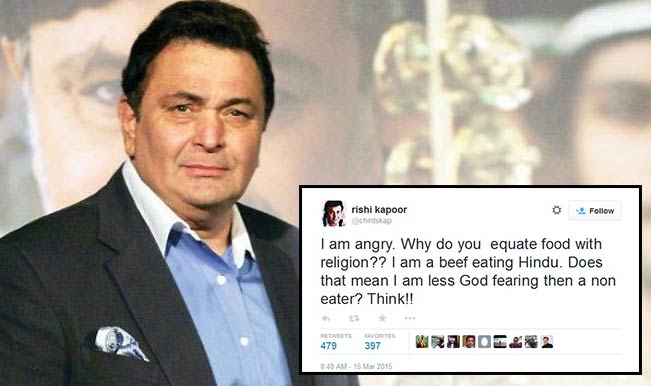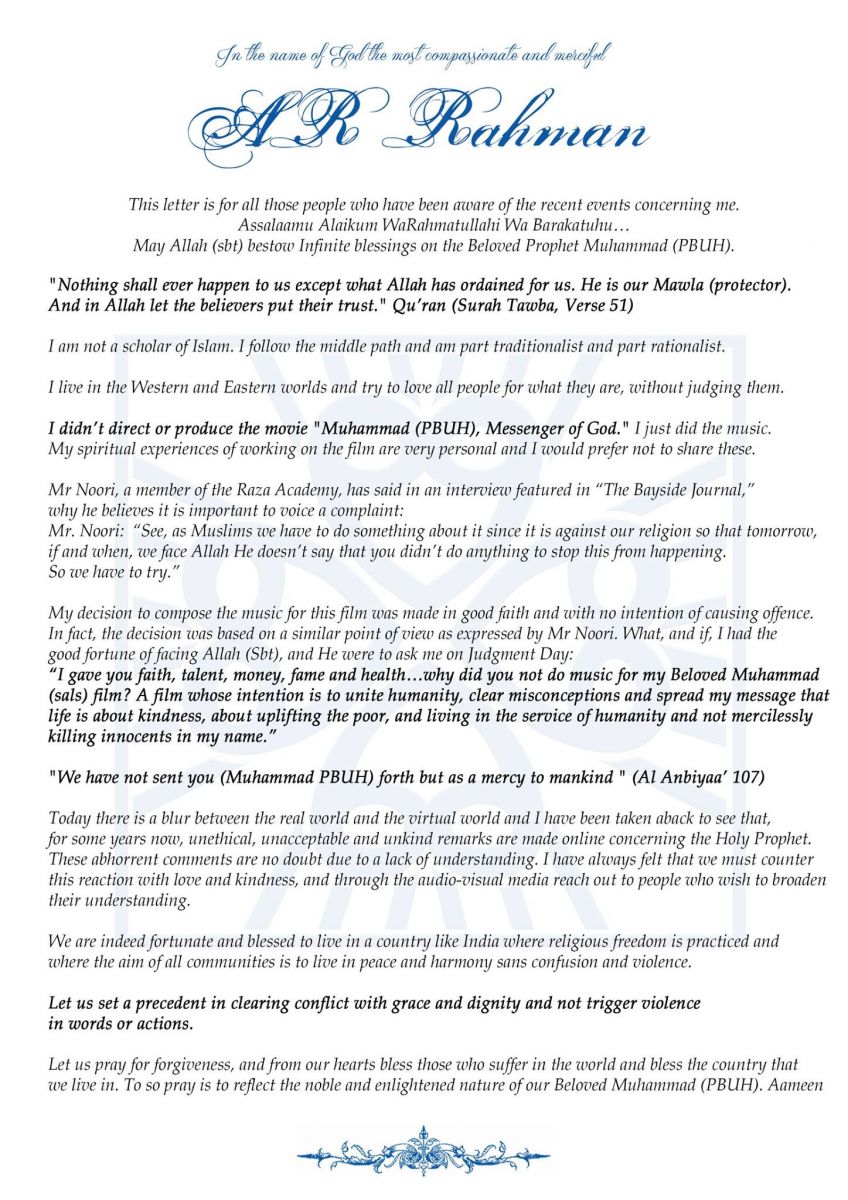`What I do, eat, drink or pray is none of your business,’ says Rishi Kapoor.`I am angry. Why do you equate food with religion?? I am a beef eating Hindu. Does that mean I am less God fearing than a non eater? Think!’
The fact that the (anti) social media trolls an icon and celebrity like Rishi Kapoor for expressing his freedom of choice, and the fact that he sticks to his guns (principals, not literally meant!!) reflect not just the times we live in, but the width and scope of the resistance needed to overcome India’s new brand of authoritarianism.

Any number of arguments can and must be made to vociferously question, and resist the authoritarian diktats of this government, at the Centre with its mini-face(s) in the states: these are Constitutional, cultural and economic. In a modern, democratic, secular state, the state exists not to ‘purge India and Indians of cultural pollution’ (read rationality, Dalit literature and analysis, Islamic culture and Christian values not to mention socialism, communism, humanism and Marxism) but to uphold constitutionally provided legal rights, Article 14, 19 and 21 that guarantee freedom of choice. The majority of Indians, regardless of what the corridors of powers at Race Course Road, that is linked to the Gandhinagar highway, would like us believe, are meat and fish eating. Former Prime Minister Atal behari Vajpayee was famously non-vegetarian and ‘secular’ ‘nationalist’ Muslims in the country’s capitals proudly tell tales of how they served biriyani to his home when he reigned between 1999-2004 ! But RSS has the remote control today over Lutyens Delhi and those RSS Brahmins who founded this outfit may be vegetarian but Maharashtra as a whole is almost entirely meat and fish eating. No wonder, RSS’ oldest political ally in Maharashtra (albeit weakened, today) the Shiv Sena, the Shiv Sena and its cousin, the Maharashtra Navnirman Sena have provided the proto-resistance to the Mumbai-Maharashtra beef/meat ban!!
Bengali and Kashmiri brahmins are non-vegetarian as are coastal Brahmin castes like the fish eating Saraswats. In fact studies by reputed institutes in the capital show that not only are a whopping 69% Indians non-vegetarian but 55% of the ‘upper’ (sic) brahmins are also non-vegetarian. So why is this narrow hegemonistic worldview of just a section of the Brahmins being imposed, pan-India?
I recall the India of the 1980s and 1990s, an India that needs re-visiting if we need to understand and locate NDA II under Modi. It was LK Advani’s led rath yatra of the period that paved the way, literally for a ‘cleansing’ of the public sphere and mind (read the spaces dominated by India’s burgeoning ‘middle’ classes that have little or no connect with the comforting term ‘middle class values’ that the fish and vegetable buying Maharashtrian male in Pune, Kolhapur or Mumbai once represented).
It suddenly become legit to spew venom and hate, be exclusivist and prejudiced, a new Indian (read Bharatiya) fashion. At the first press conference that LK Advani, the clever architect of this cultural re-positioning (Modi is an obvious high-end and high-cost product, as their non-existent relationship now shows) held in a battered Bombay after the demolition of the Babri Masjid in December 1992, he began his address, not with what had transpired in full public view at Ayodhya, not at the transgression of law and the Constitution 9in Bombay. Not at the body blow to faith and allegiance to a large section of Indians, that that the un Constitutional action at Faizabad-Ayodhya had dealt. Advani referred, not a word to the grotesque nature of the murder and mayhem that ruled Bombay’s streets in that December-January of 1992-1993.
No. He began the address to the media with a tiny story of how Indians, quiet, god fearing idol worshipping Hindus are treated on their entry to Saudi Arabia. Not to the rest of West Asia, specifically Saudi Arabia. ‘The man has come here, for his livelihood..’, began Advani at the press conference, and continued. Advani drew a visual image of a Saudi police prototype, who cruelly and with military precision scans that poor Hindu’s personal belongings for any signs of kafir-dom, the small murthi, the idol or whatever. The god fearing entrant into Saudi has one faithful calendar with the picture of the Hindu deity most precious to him and this is in his little pocket diary. Since, we are told by Advani, that this Saudi prototype is relentless and precise in his fanatic duty (and also God fearing, except this God is the almighty Allah), this three-four inch printed calendar does not escape his preying hands. Triumphantly locating this sign of the kafir, he pulls it out with a florurish and tears it to shreds. Swelling tears and a bitter, simmering hatred, we are then told remain as migrant memory. Of Saudi Arabia. Of Islam.
Of what relevance was this tale to a battered Bombay? I remember the response of my colleague, photographer Pankaj at Business India, where I worked at the time. Decent and God-fearing, he found an echo in what Advani said and whispered to me, this is just what happened to my brother in law when he went to work in the Gulf. Journalists had more spine them. So many of us sprung up and asked what the relevance of this narrative was to India’s urbs prima, just after an anti-minority pogrom of horrific proportions had been unleashed on the back of the Babri Masjid demolition. To legitimize the killings ?
How is this relevant in the here and now? The pollution of the public sphere by a non-Constiutional values that legitimises the superiority of the ‘us’ versus ‘them’, that privileges one section in rights and citizenship and worst of all seeks to fashion culture and history to suit this authoritarian project began first with the Hindu Mahasabha and then concretely with the Rashtriya Swayamsevak Sangh (RSS) since 1925. For close to sixty years, Indians gave this worldview that drew inspiration from Mussolini’s Italy and Hitler’s Germany (and in fact was proto-modern not traditional) scant attention and treated it with the contempt that it deserved. Today 31 per cent of us Indians support its political avatar even if we do not understand all the culturally hegemonistic underpinnings.
There was one beautiful response from a young Muslim that I saw and shared on facebook after the hatred unleashed against the non-vegetarian other. He wrote, ‘during Ramzan, I too would like everyone to starve and stay thirsty, from sunrise to sunset for a month.’ He obviously meant this sarcastically and there lies our hope. A whole lot of youngsters today are thinking and reacting out of the traditional identity box and this is the huge energy and resource on which we need to build. A lasting and rational resistance.
 I want to end this week’s sharing with my readers with a beautiful quote from music director AR Rahman over the music he created for a recent film. The usual two-bit fatwa was issued since the film was on the life of Prophet Mohammad.
I want to end this week’s sharing with my readers with a beautiful quote from music director AR Rahman over the music he created for a recent film. The usual two-bit fatwa was issued since the film was on the life of Prophet Mohammad.
Rahman asks in a beautifully drafted open letter, responding to a controversy that it had caused “What, and if, I had the good fortune of facing Allah (Sbt), and he was to ask me on Judgement Day: “I gave you faith, talent, money, fame and health…why did you not do music for my Beloved Muhammad (sals) film? A film whose intention is to unite humanity, clear misconceptions and spread my message that life is about kindness, about uplifting the poor, and living in the service of humanity and not mercilessly killing innocent in my name…..Today there is a blur between the real world and the virtual world and I have taken aback to see that, for some years now, unethical, unacceptable and unkind remarks are made online concerning the Holy Prophet. These abhorrent comments are no doubt due to the lack of understanding. I have always felt that we must counter this reaction with love and kindness, and through the audio-visual media reach out to people who wish to broaden their understanding…We are indeed fortunate and blessed to live in a country like India where religious freedom is practiced and where the aim of all communities is to live in peace and harmony sans confusion and violence……Let us set a precedent in clearing conflict with grace and dignity and not trigger violence in words or actions…..Let us pray for forgiveness, and from our hearts bless those who suffer in the world and bless the country that we live in. To so pray is to reflect the noble and enlightened nature of our Beloved Muhammad (PBUH)."
What wise wonderful, re-juvenating words, in this era of bans and fatwas.
A version of this appeared as the author’s weekly column in the daily, Rashtriya Sahara
